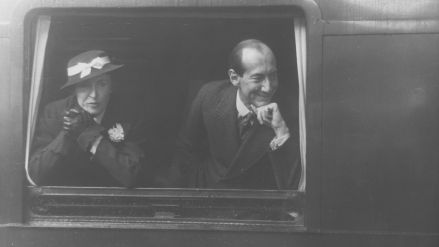The life of soldiers that after a turbulent period at the front return to civilian life is sometimes difficult. How did your father cope with that? What did his life after WWII look like?
On August 27, 1944, as the commander of No. 317 Squadron on a reconnaissance mission to locate the Germans retreating beyond the Seine, he was shot down, wounded and taken prisoner. After the miraculous escape and return to Great Britain, with a bullet in his liver, he had no chance to continue his career as a fighter pilot. At the age of 34, he found himself in a very unpleasant situation. For the first time since 1931, that is, from the moment he joined the Polish Army, his future was uncertain. He did not know how to support his wife and son. There was nothing he could do except flying. Fortunately, the RAF did not leave him alone, and neither did the other pilots who risked their lives and were injured on duty. For the next three and a half years, among others, he attended the Aviation College, worked as a liaison officer at Fighter Command HQ in Stanmore, enrolled in a two-year course in trade and economics at the London Polytechnic, worked in the General Division of the Polish Training and Deployment Corps as an officer. Eventually, along with his wife Barbara and her family he made this difficult decision to emigrate to Ontario.
 SIGN UP TO OUR PAGE
SIGN UP TO OUR PAGE
 In Canada, a completely new life began for the former fighter pilot Captain Władysław Gnyś.
In Canada, a completely new life began for the former fighter pilot Captain Władysław Gnyś.
At the end of March 1948, a former Air Force officer, who knew nothing about animal husbandry and farming, started working as a farmer running a 100-hectare farm. But he managed.
The end of the war brought about universal joy, but for Poles it was an incomplete joy – we found ourselves under the heel of another occupier, this time the Soviets. How did your father perceive the situation in Poland at that time?
Dad was aware of the fact that after the war Poland was occupied by communist Russia, which had installed a puppet government on the Vistula in order to exercise power with the help it. He knew that returning to his beloved family, most of which had survived the German aggression, would be dangerous for him. He also knew that the communist secret services were arresting all former freedom fighters like him who could pose a threat to the fragile new communist government. Dad believed the communists could not be trusted, and although he really wished to return to his hometown of Sarnowo to see his relatives, he didn’t.
Did he warn his fellow pilots not to return to Poland?
Yes. However, there were those who did not listen to him, such as the famous pilot Stanisław Skalski, who returned to the country in 1947 and was then arrested, falsely accused of espionage and sentenced to death. Later, his sentence was changed to life imprisonment, of which he served eight years. In the early 1950s, Colonel Józef Jungrav returned to Poland. He was also arrested and convicted on false charges of being a spy and then executed in 1952. There are many such cases.


 SIGN UP TO OUR PAGE
SIGN UP TO OUR PAGE
 In Canada, a completely new life began for the former fighter pilot Captain Władysław Gnyś.
In Canada, a completely new life began for the former fighter pilot Captain Władysław Gnyś.




